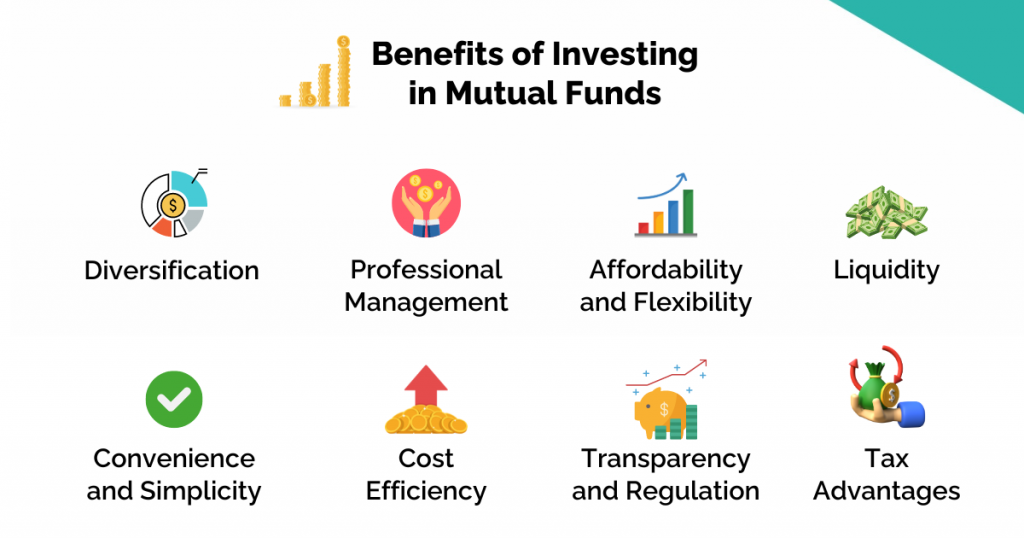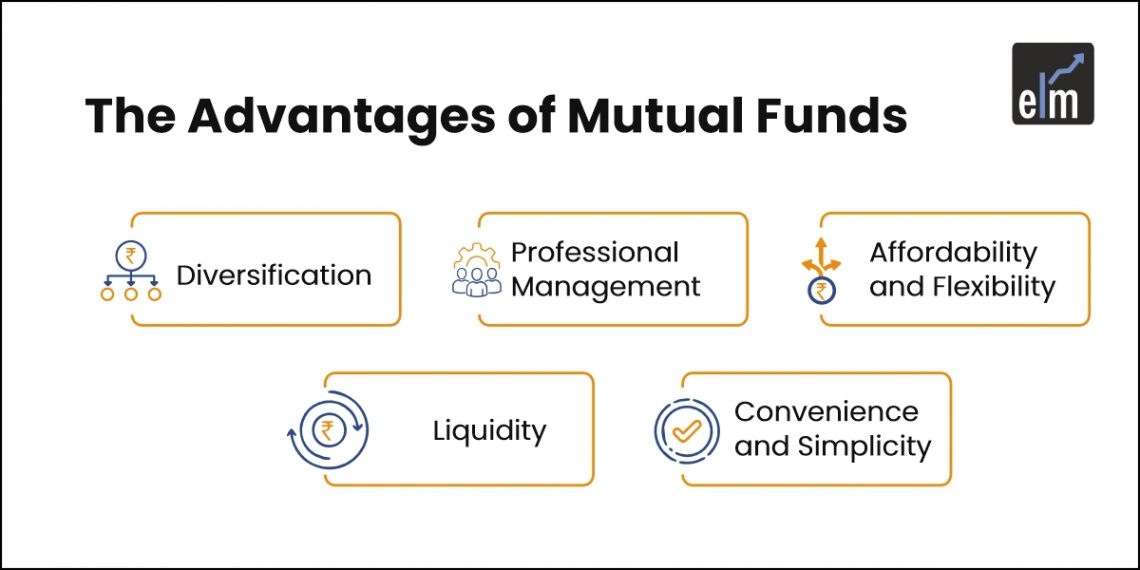For many individuals, mutual funds are the most popular type of investment vehicle.
They have numerous benefits, including professional portfolio management, lower risk, and dividend reinvestment.
Adding a mutual fund to your financial portfolio is something you should really consider doing, regardless of experience level.
However, before investing in mutual funds, let us understand the advantages of mutual funds:
Table of Contents
What are Mutual Funds?
Mutual funds are investment pools which combine shareholder contributions for purchasing securities, bonds, and other assets.
A diverse range of funds encompassing many industries and asset classes are available, overseen by qualified portfolio managers who aim to generate capital gains for the fund’s stakeholders. Mutual funds impose different fees on investors for the services they offer.
An investor seeking exposure to a range of assets through a mutual fund investment may not have voting rights and may be subject to certain regulations, requirements, and fees.
Advantages of Mutual Funds
Here are some of the advantages of mutual funds-

1. Diversification
Your fund manager will allocate your money across a variety of securities, such as equities, debt funds, and other money market instruments when you invest in mutual funds.
There is little possibility that any instrument will not develop to the fullest extent possible, according to logic.
Additionally, it’s possible that the instruments balance each other out, reducing risk and increasing the safety of your investment if one performs worse than the other.
Diversification is one of the advantages of mutual funds; let us discuss the other advantages of mutual funds below-
2. Professional Management
For investors without the time or expertise to conduct their own research and asset allocation, mutual funds are a smart option. A fund manager handles everything and decides how best to use your investment.
The research team and the fund management select the correct instruments for the fund, including debt, equity or any combination of them depending on the investment objectives of the fund. This also includes choosing how long to hold shares.
3. Affordability and Flexibility
You must have noticed that the price declines with increasing units. For instance, you will get a 500g pack of toothpaste at about Rs 40 if a 100g pack goes for Rs 10.
The same reasoning applies to mutual fund units. Buying many units of mutual funds at once results in lower processing fees and other commissions compared to one unit of a mutual fund.
Flexibility and affordability are examples of the benefits of investing in mutual funds.
4. Liquidity
Liquidity refers to the ability of a thing to be converted into money.
Suppose you had an emergency, and you could not raise enough money from your account.
It is impossible to borrow or sell land quickly. Nevertheless, if needed, mutual funds are convenient for withdrawals.Besides it is common knowledge that investments in mutual funds are highly liquid and can be transferred into cash easily when required.
Having said that, whether or not you can withdraw your investment instantly from your fund fully depends on its lock-in period which varies between mutual funds.
5. Convenience and Simplicity
Investing in mutual funds is comparatively easier than investing in the stock market, which may be rather complex. To open a mutual fund account, all you have to do is go to a bank or other financial institution, and they will take care of the rest.
Additionally, you can open a mutual fund account from the convenience of your own house. You can use online accounts or even mobile applications to begin investing as soon as your Know Your Customer (KYC) documents are validated.
6. Cost Efficiency
The mutual fund with the lowest expense ratio is the one you should select after comparing its costs. It is the expense ratio, or mutual fund management fee.
7. Transparency and Regulation
Under the SEBI (Mutual Funds) Regulations, 1996, the Securities and Exchange Board of India (SEBI), the capital markets regulator, regulates mutual funds.
SEBI has established strict guidelines that maintain investor safety, openness, a suitable framework for mitigating risk, and fair valuation criteria.
8. Tax Advantages
Section 80C of the Income Tax Act of 1961 allows you to invest in tax-saving mutual funds known as ELSS, which qualify for an annual tax rebate of up to Rs 1.5 lakh.
However, it has been ascertained that long-term capital gains (LTCG) surpass alternative tax-saving avenues regarding returns over the years but are taxed at 10% after exceeding Rs 1 lakh.
9. Accessibility and Variety
Compared to other investment options, many mutual funds have comparatively modest minimum investment requirements. This makes it possible for those with little money to trade stocks. To help with budgeting, some funds even include Systematic Investment Plans (SIPs) that let you invest a certain amount on a monthly basis.
You can view the Mutual Funds Analytics in StockEdge.
Frequently Asked Questions (FAQs)
Are mutual funds a good investment for beginners?
These funds may be invested in a mix of several asset classes, bonds, stocks, or commodities. Before making an investment in a fund, you should make sure you are aware of the risk associated with the underlying assets of the fund. Mutual funds are a fantastic choice for novice and seasoned investors alike.
How do mutual funds help diversify my portfolio?
Mutual funds, as opposed to individual equities, are inherently diversified; it’s like purchasing a variety pack of your favorite candies, which gives you a taste of everything. Government bonds with a long maturity have historically yielded between 5% and 6%. Conversely, high-quality mutual funds will frequently quadruple that rate of return.
How much money do I need to start investing in mutual funds?
Take your monthly income and deduct all of your monthly expenses, such as emergency fund contributions and short-term goals, to find out how much money you should invest each month in mutual funds. You can use the remaining amount for investments.
Are mutual funds risk free?
While mutual funds are often low-risk due to their investments in low-risk securities, no investment is risk-free, and this is especially true of them.
Conclusion
Mutual funds offer investors an excellent opportunity to diversify across a wide range of assets without the need to purchase individual securities directly. One of the key advantages of mutual funds is that they allow investors to delegate their investment decisions to experienced professionals. Moreover, tools like a SIP calculator can help investors plan their investments more effectively by estimating potential returns over time. However, while mutual funds can be a prudent and relatively safe investment option, they are not without their drawbacks and limitations







